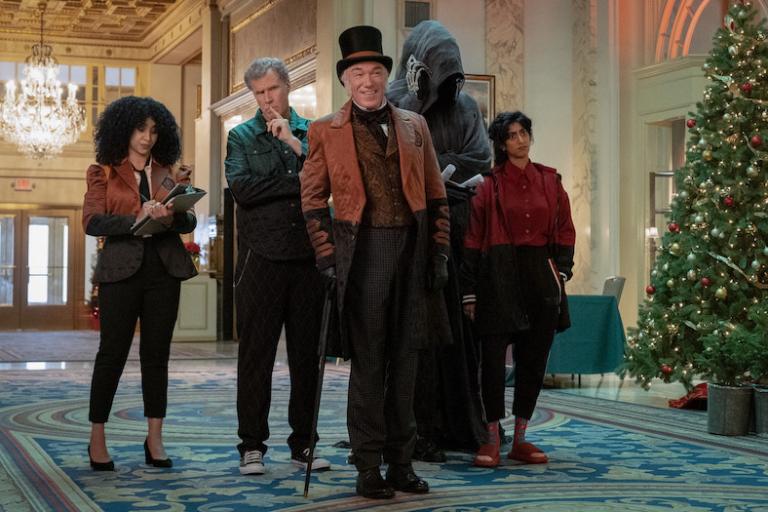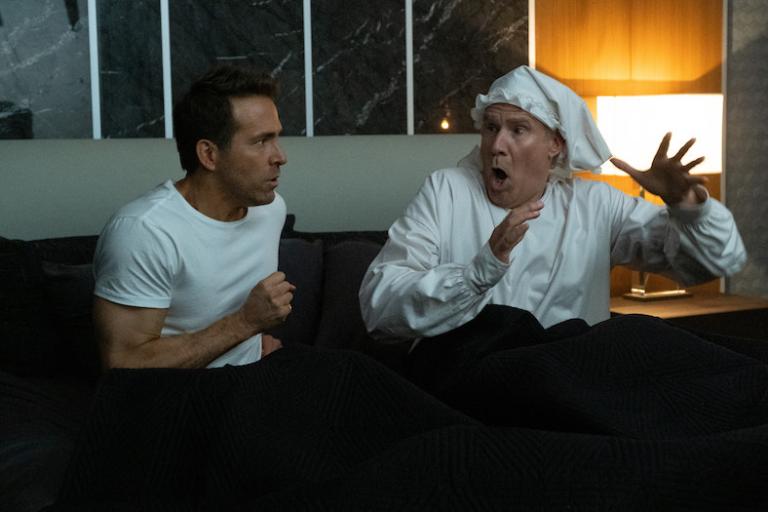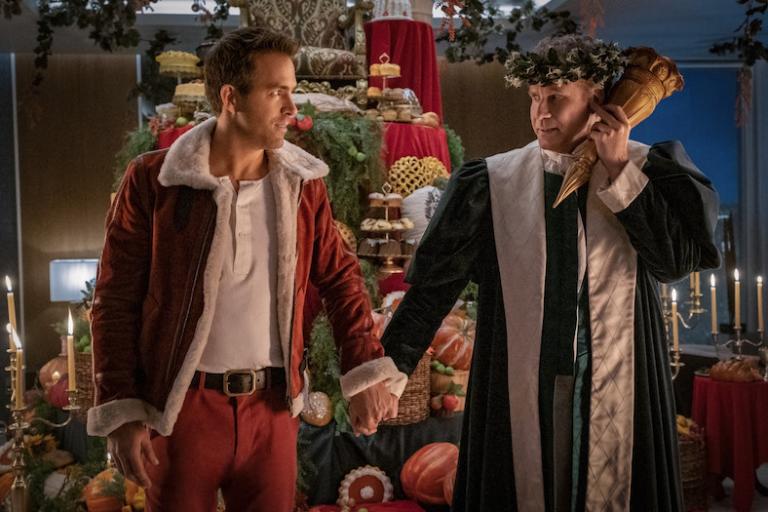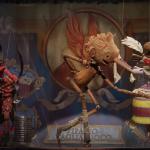
Bah. Humbug.
So I might’ve said a few weeks ago to Spirited, yet another revision of A Christmas Carol. More than 100 versions of Charles Dickens’ classic have been made, featuring everyone from Bill Murray to Mickey Mouse. Hey, I love Scrooge and Tiny Tim as much as anyone. But we’ve seen it. The possibility of finding something new there? Well, that seems deader than a coffin nail.
And then I actually saw Spirited, Apple TV+’s clever, musical addendum to the Christmas Carol. And it’s one of my favorite movies of the year.
Why? It’s original. It’s funny. Its songs are surprisingly hum-worthy. But more than anything, I loved what the movie had to say about redemption. Because in a way, that’s what A Christmas Carol—and Christmas itself—is all about.

More Gravy than Grave
According to Spirited, Ebenezer Scrooge wasn’t the only cantankerous soul to be visited by three spirits on Christmas Eve. Turns out, it happens every Christmas, with each visitation the culmination of a whole year’s worth of work. And while the ghosts of Christmas Past, Present and Yet To Come are the stars of this annual show, they’re supported by hundreds of other spirits—many of whom are prone to break into lavish musical numbers at the least provocation.
“You haunt someone,” Christmas Present (Will Ferrell) tells us. “You change them into a better person. And then we sing about it.”
But Christmas Present doesn’t get the same charge out of haunting as he used to. Oh, sure. It’s still great to know that he’s literally changing lives. But how much of a difference is he making? How many of these changed people go on to change the world? Judging from the comments sections on social media, not many, and not enough.
This year, he has his sights set on a bigger fish: Clint Briggs (Ryan Reynolds), a public relations specialist who excels at ginning up rage. Clint tells a group of live Christmas-tree growers that it’s not enough to tell the world about their product: They need to make their potential customers hate the alternative—artificial trees—and the people who make and buy them.
“He’s like the perfect combination of Mussolini and Seacrest!” Christmas Present says of Clint.
But there’s a catch, as Jacob Marley, the Christmas Spirit CEO, points out. Clint has been stamped as an “unredeemable.” Clint doesn’t believe that people change, which makes it nearly impossible to change him—especially in one night.
Despite Marley’s objections, Christmas Present wins the day, and Clint Briggs becomes the year’s perp.
But maybe Clint isn’t the only one due for a change.

A Sprig of Cynicism
Spirited doesn’t have a ton of explicitly Christian content (though in the song “We’re Bringin’ Back Christmas,” Clint does namecheck the “birth of our God”). But it, like Dickens’ original story, is deeply spiritual—and not just because of the ghosts flitting about.
Every Christmas Eve, those ghosts are out to improve somebody’s soul. They’re working to save their perps from themselves. Spirited tells us that these spirits spend all year getting the details of their perp’s life just right—using all the tools they have to convince their charges that they’re in need of a moral makeover.
But for Clint, the need for such a makeover is beside the point. He’s spent his career studying humankind, too. And he believes that people are selfish and lazy and weak—even if we desperately try to tell ourselves otherwise.
When Christmas Present takes Clint back into his own past, he shows Clint a Christmas when his mother lied to him: She bought him a dog, Mom tells him, but he ran away because someone left the door open. Little Clint’s older, wiser sister tells Clint that the dog was a lie, but little Clint puts on his coat and dives into the cold, anyway, looking for a puppy that was never there.
Grown-up Clint tells Christmas Present that was the best gift he ever received: “The solid gold lesson that people will believe anything if they want to believe it. That lesson made me so rich, I could buy a million puppies.”
Think about Clint’s take on human nature for a minute: That we’re lazy and gullible and shallow and sometimes cruel. The Bible tells us the same thing. We’re cynics and sinners, each and every one. Clint built his fortune on these truths, as horrible as they are. And he knows that people don’t change.
And that has some (ahem) dispiriting implications for Christmas Present himself. (Caution, minor spoilers ahead.)

Spare Change
Turns out, Clint isn’t the first “unredeemable” to be visited by these three holiday ghosts. Back in the day, Christmas Present was the first and, to date, the only other unredeemable to successfully navigate the program. When he was alive, Christmas Present was, in fact, Ebenezer Scrooge himself.
We all know what remarkable changes Scrooge went through that Victorian Christmas night. We’ve heard the original A Christmas Carol enough times to know. But Christmas Present admits that he didn’t have to stay changed for that long. He died three-and-a-half weeks later. “The leading cause of death back then was January,” he tells Clint.
As Clint points out, anyone can change for three weeks. How does Christmas Present—Scrooge—know the change was real? Lasting? Saving?
Christmas Present has wondered the same thing for more than a century. It’s kept him working as a ghost long after he could’ve “retired,” which in a ghost’s case means getting another chance at a mortal life. He steers clear of that gold watch because, to retire, means he’d be confronted with the possibility that maybe he didn’t change as much as he thought he did.
For his entire afterlife, doubts have nagged at him. Did he truly change? Was he truly redeemed? Or was he what his file said it was: Unredeemable?

Good Afternoon
I’ve been pretty up front about my struggles with depression, so much so that I wrote a book about it. And in the book, I talk a little bit about how I was baptized—how I walked down the aisle of a tiny Baptist church when I was pretty tiny, too. I didn’t know exactly what I was doing then; part of me just simply wanted to have a chance to see what the church’s baptismal looked like.
For years after, I wondered if the baptism took.
Pair that with depression, which got its claws into me in college. Wrapped up in all of that was a sense of being worthless, of being a waste of space. Of being unredeemable.
When I do interviews about the book, I often say that it’s important to lean into what you know, not what you feel. We know that God loves us. We know that we can be saved—and if we’ve accepted Christ into our lives, we have been saved. No one can take that away from us.
But that knowledge doesn’t always change the way I feel about myself. It doesn’t wipe away the worthlessness that I sometimes feel. I know one thing, but sometimes—even to this day—I feel as though I’m past redemption, or that I’m simply not worth it. And like Christmas Present, I think that sometimes I try to wipe away those feelings not through prayer, but through work.
In a way, it felt as though when Christmas Present sang “Unredeemable,” I already knew the tune.
https://www.youtube.com/watch?v=1oDZkVIm38w
God Bless Us Everyone
All these themes of change shouldn’t distract it from what the New Testament tells us. We can’t work our way to heaven. While Spirited tells us that few people change in just one night, the change that God looks for takes place in one massive choice: When we choose to acknowledge Jesus as the one who steers our ship.
Spirited acknowledges the futility of work-based salvation in its own way, too. Christmas Present was trying to work off his many debts. But he knew that, no matter how hard he worked, no matter how much good he did, it might not be enough to wipe his own record clean. He needed a new strategy. He needed to be forgiven—and to forgive himself. And forgiving yourself can be one of the hardest things to do.
Spirited is far from perfect. But it and Christian theology run parallel in some unexpected ways. One, we can all be more like Scrooge than we’d care to admit. Two, we can change—even though change rarely happens in one night. And three, none of us are unredeemable. None of us is beyond saving.
“Even if you lost your way, you don’t have to stay a lost cause,” we hear in Spirited’s finale. That’s something all of us probably need to hear now and then. Because we all lose our way sometimes. We all struggle to do what’s right. But we have hope. And that hope is rooted in Christmas itself.













